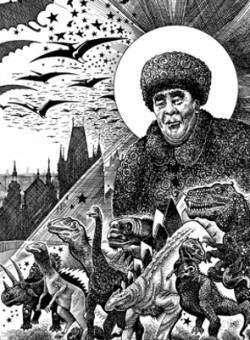The Czech Foreign Minister, Lubomír Zaorálek recently invited Russian ambassador Sergey Borishovich Kiselev to Czernin Palace. The conversation was mainly about two issues: Russian propaganda on state-owned television concerning the events of August 1968 in Czechoslovakia (a current Russian misleading adaptation of events-Ed) , and Russia’s list of ‘undesirable people’ in the European Union (Russia issuing a list of names that will be barred entry into Russia as revenge for the EU’s doing the same-Ed.).
On the list there were four names of people from the Czech Republic: Karel Schwarzenberg, Marek Ženísek, Jaromír Štětina and Štefan Füle.
Kiselev explained, that the list is made up of “those who actively support a coup in Ukraine,” which he regarded as “unjustified actions of the European Union against Russia”.
The list was created a year and a half ago and was not intended for publication. However, Russia decided to publish it as a ‘demonstration of good will’. ‘There was nothing wrong about the list – it was an act of trust’, the ambassador explained to Zaorálek.
So who actually created the list? It was the Russian Embassy in Prague. “The activity of the Russian Embassy is in conflict with regards to maintaining a relationship built on quality and credibility. It is obvious that they are dedicating their time more to meddling in our internal political affairs than in dedicating their time to producing professional reports”, said Ivan Gabal, A Czech MP.
HlídacíPes.org (an independent watchdog organization – Ed) has already pointed out that the number of employees in the Russian embassy is unusually high. A disproportionately high number of employees of the Russian embassy have repeatedly mentioned the Czech Secret Services in their reports.
When asked about the Russian propaganda film, Zaoralek replied: “The main thing that I asked the Ambassador was how on earth can you speak about us Czechs in Russia? The movie, which paints a black and white world, portrays the West as ‘evil’ and us as constantly defending ourselves against them. We are the good ones and they are the bad.” According to Zaorálek, Kiselev’s reply was: “ignore it; it’s just a movie on TV. You are overestimating its importance.” Kiselev claimed that the the film is not a reflection of the official position of Russian politics. “Russian officials are aware of their responsibility for the events of 1968, which was a tragedy both for us and for you,” the ambassador told Zaorálek.
The text was published under the title ‘The Russian ambassador does not apologise for anything” on Hlídací pes. Translated by Natalie Rybová, edited by TNP
published: 13. 8. 2015







